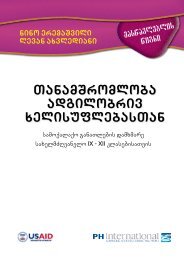The Geneva Protocol, by David Hunter Miller
The Geneva Protocol, by David Hunter Miller
The Geneva Protocol, by David Hunter Miller
You also want an ePaper? Increase the reach of your titles
YUMPU automatically turns print PDFs into web optimized ePapers that Google loves.
CHAPTER XX. 150<br />
the Permanent Court of International Justice.<br />
101. Article 11.--<strong>The</strong> <strong>Protocol</strong> to be open for signature <strong>by</strong> {253} all States, to be ratified, and the ratifications<br />
to be deposited with the League. <strong>The</strong> <strong>Protocol</strong> to come into force between the signatories ratifying it, as from<br />
the date of ratification.<br />
102. <strong>The</strong> sub-committee held eight meetings in all, finishing its work on the 22nd September. <strong>The</strong> articles<br />
were not discussed in their numerical order, and a discussion of one article was often adjourned while the<br />
examination of another article was begun. As it is not attempted here to give a full summary of the<br />
discussions, it will perhaps be convenient to take the articles in order and show what modifications were<br />
introduced.<br />
103. Article 4.--Objection was raised to this article, mainly on the ground that it gave the Council or the<br />
Permanent Court too wide powers of interference, and introduced the idea of a "super-State." After<br />
consultation with other Delegations, the British Delegation produced an alternative draft which was adopted,<br />
and which was substantially embodied in the eventual <strong>Protocol</strong> itself (becoming article 7). <strong>The</strong> only essential<br />
difference between this draft and the eventual text was that the former provided, in paragraph 2, that the<br />
investigations should be carried out "<strong>by</strong> the organisation set up <strong>by</strong> the Conference for the Reduction of<br />
Armaments to ensure respect for the decisions of that Conference.<br />
104. Article 6.--Words were inserted to the effect that demilitarised zones were recommended "as a means of<br />
avoiding violations of the present <strong>Protocol</strong>." <strong>The</strong>y were to be placed under the supervision of the Council at<br />
the request "and at the expense" of one or more of the conterminous States.<br />
105. Article 7.--<strong>The</strong>re was considerable discussion on the first paragraph, and some demand for a distinction<br />
to be drawn, as in the Covenant, between economic and financial sanctions on the one hand, and military<br />
sanctions on the other. It was, however, explained that the proposed definition of the aggressor had produced a<br />
clearer situation, in which there was no reason why the application of sanctions of all kinds under article 16 of<br />
the Covenant should not be justified. It was pointed out that the {254} wording of this first paragraph was<br />
illogical. <strong>The</strong> "obligations" could not "become operative against an aggressor." Accordingly, it was agreed to<br />
substitute the words "the obligations will immediately come into force in order that the sanctions provided<br />
may immediately become operative." <strong>The</strong> paragraph was then passed with the above amendment.<br />
106. Exception was taken to the words in the third paragraph "undertake individually or collectively to come<br />
to the assistance." It might prove difficult to evolve collective plans, and it was agreed, on the proposal of the<br />
British Delegate, to substitute the words "give a joint and several undertaking to."<br />
107. In the same paragraph the use of the expression "to ensure the safety of the land and sea communications<br />
of the attacked or threatened State" was questioned in the first place, because it seemed that it might imply<br />
naval or military operations. In reply, it was pointed out that the words in the same sentence "for this purpose"<br />
showed that this paragraph related solely to economic and financial sanctions. In the second place the word<br />
"ensure" was objected to, on the score that to undertake to ensure communications might be to undertake an<br />
impossibility. Finally, the words "take measures to preserve the safety of communications" were substituted.<br />
It was further pointed out that these provisions were to be applied to protect an attacked or threatened State<br />
and that a similar distinction was expressly contained in the Covenant.<br />
108. Article 7A.--<strong>The</strong> British Delegation desired a redraft of this article, taking exception in particular to<br />
sub-paragraph (1), in which the word "blockade" seemed to suggest belligerent naval action. <strong>The</strong>y at first<br />
suggested omitting all words after "Council of the League of Nations" and substituting "shall, as soon as<br />
possible after the <strong>Protocol</strong> has been ratified, take steps to ascertain from each of the signatories what<br />
organisation or legislation is necessary to give effect to the economic and financial sanctions." An alternative<br />
suggestion from another quarter was to substitute the words "putting into force the economic and {255}
















